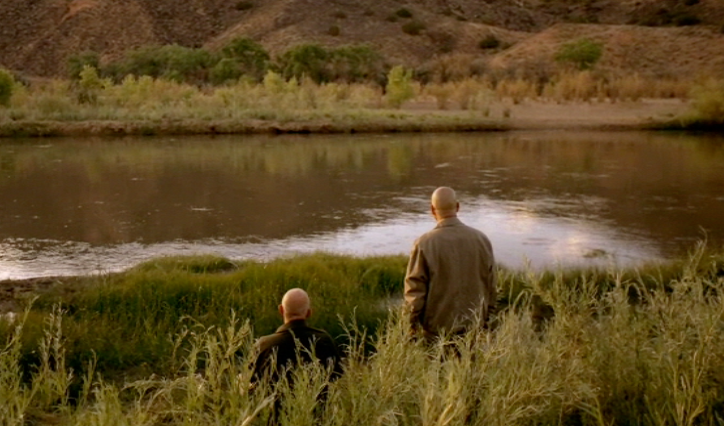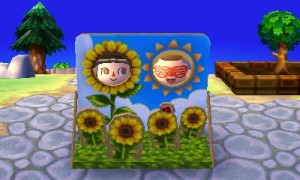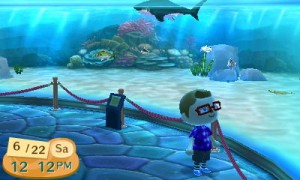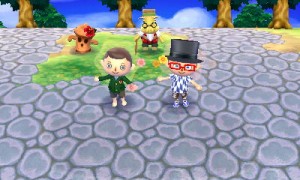Leftover Cuties, “Don’t Think Twice, It’s All Right”
Departures, 2012

When critics want to convince their audience that a certain television show — or television event — rises above its peers, one word that gets tossed around is “cinematic.”
I understand what they’re saying…or what they mean to say. They are suggesting that television, even good television, is one thing. But movies? Man…that’s a whole other ballpark, and here is a show that can run with the big boys.
I guess I never really saw that distinction for myself. I don’t think of film as being an inherently “higher” artform than television. Both movies and TV shows have left me cold, and both movies and TV shows have moved me to tears. It’s all in the hands of the actors, and the writers, and the directors, and the composers, and everyone else involved. I wouldn’t say it’s a particular compliment to call a television show “cinematic.” Or, at least, it’s no more a compliment than it would be to call a great movie “so good it would make for a fantastic episode of television.”
Here’s where I’ll show my bias: I think a true complement to a television show would be to call it “literary.”
Breaking Bad is literary.
I say that because of its approach. Not its content, or its acting (though I’d have very nice things to say about those as well), but because of the way it layers and progresses its narrative. The way its details unfold in a way that actually feels like one sentence following the next.
Long, quiet stretches and deceptively brutal montages feel dense…like we’re watching a text play out but aren’t allowed to read it. There’s always a sense that even in its wordless moments, we’re being enveloped by narrative, by atmosphere…that we’re in the hands not of a writer or a storyteller, but an artist and a wordsmith.
I think this is because Vince Gilligan and his crew have managed to tell a story that functions exactly the way a great novel could. While episodes might have self-contained little narratives of their own (Walt chasing a fly, Jesse protecting a child, Hank being transferred to El Paso), they all function the way chapters would. They have their rising and falling action, their punctuations and their punchlines…but they layer. They reveal. They inform our readings of the other chapters, and they feel — for all their long, quiet stretches and moments of false relief — like important pieces of a greater whole.
It’s not a show you can parcel out. There’s no episode that truly stands on its own. A show described as “cinematic” might be easily broken into its spectacular component parts, but one that’s “literary?” No. No no no. That needs to stay together.
I’ve only recently caught up on the first half of the final season. The second half — the final chapters — will play out later this month, and I intend to review them. Why? Because this television show feels like the longest novel I’ve ever read, and it’s still one I don’t want to put down. But I know I must…because art is a statement, and statements end. And when it’s over: a long, quiet stretch. We can take as long as we like to think about what we’ve just seen. I get the feeling Walter White will not have the same luxury.
Breaking Bad feels literary because it’s unfailingly true to its own logic. While I wouldn’t describe the show as realistic, per se, I would describe it as relentlessly logical. Even now, as we tumble through these final moments, the characters are still dealing with repercussions of the very first episode. Nothing goes away. Consequences linger. The dead make their presences known. Details once so rigidly attended to now bubble to the surface, unseen.
I like that, because it provides a brilliant, ongoing tension that’s entirely earned by the show, and also because we never know when we’re going to see the same idea in a different light. In the article I linked to above — a discussion of the excellent “Peekaboo” — I talk about how Walter’s decision to cook meth gradually loses its own rationale: he needs the money to pay for his cancer treatment, but some old friends are willing to pay for it out of pocket. He needs the money to provide for his family, but he doesn’t stop when they have more than enough. His motives blur, almost visibly, but it’s only in this most recent batch of episodes that he explains why: he’s in the empire business.
It’s not about money, or drugs, or family, or cancer, or anything. It’s about pride, wounded decades ago, and what he sees as his first opportunity to earn it back. Walter is a broken man — there’s no surprise about that — but we’re still plumbing the depths of just how broken, and in what ways. And the fact that they can still pull this off, without re-treading ground or re-writing histories, is phenomenal.
I remember watching the first season and thinking that I didn’t like Cranston’s performance. Or, rather, I didn’t like one aspect of his performance: he seemed a bit too obviously broken. I saw a good man who was making some bad decisions, so I wondered why Cranston played him like a bad man making bad decisions. That was my first lesson to trust Vince Gilligan, and I haven’t stopped since.
And even now, toward the end, we’re not drawing limply toward a finish line. Breaking Bad is a story, a literary tale, and it continues to evolve right up to and through its final point. By his own hand Walter has lost Jesse and Mike…replacing them with Todd and Lydia, who are just competent enough for him to justify his decisions but flawed enough that we know what’s coming. It’s a ramshackle arrangement he’s built up around himself…and however tall he manages to get it, it’s only a matter of time before it all comes crashing down.
It’s a simple concept, and nothing particularly clever, but the way in which Gilligan and his crew pulled it off was just perfect. Jesse managed to be not only superior to Walter morally, but also intellectually as he’s the one who suggests the magnets and the train robbery while Walter is too upset to think straight. He blossomed into a more valuable member of the team than Walter could ever appreciate…and as soon as he did, he was replaced with Todd, who murdered a child in cold blood, and whose chief recommendation is that…well…he’s there.
And the cool, collected, calculating Mike…the one man who knows how both sides of the game must be played…is killed by Walter’s own hand. The moment that gun went off was an incredible one, played perfectly, Cranston’s face betraying the most genuine, “Oh shit,” he’s ever given this show, and for the first time he’s thinking it for the same reason as the audience. Now, with the last man who could have possibly navigated him to safety dead by the riverbank, Walter must turn to Lydia, another newcomer, easily shaken and prone to letting details slip unintentionally.
Walter had one world. He built another.
The madness of that small success encouraged him to knock out those supports and build another still.
His tower grows higher, but he’s using the wrong materials.
Just because he shot Jesse James…that doesn’t make him Jesse James.
It’s a warped tale of hubris and fate…both self-manufactured and the kind that is thrust upon you. It’s the story of a man who could have a gentle associate killed just to make a point, and then chuckle fondly when he finds a reminder of that person.
And then, of course, leave it on the toilet.
Just in time for his DEA brother in law to find.
Right after swearing the life off forever.
It’s a novel. It’s a work of literary fiction.
Just because you finished the chapter…that doesn’t mean the chapter is finished with you.
All you can ask is that somebody shuts up…and lets you die in peace.
Fuck I love Breaking Bad.
Years ago I dated a girl who loved Animal Crossing. Her friends loved Animal Crossing too. That’s not surprising…it was a massively popular game. I had nothing against it; I’d just never played it.
They booted it up one day and passed me a controller and helped me start a new character. I had no control over what my character would look like, and as soon as the game started I was responsible for paying off a home loan and making pointless deliveries to animal-people I didn’t know or care about.
That was the game. Also I had to be extra nice all the time to the animal-people or they’d move out and then, I guess, I’d feel bad about it.
 It didn’t click with me. I got nothing out of it. Again, it was a hugely popular game so I figured I just wasn’t cut out for it. There was no appeal. As Mario I could rescue a princess and as Link I could swordfight and as Olimar I could command armies…but Animal Crossing just gave me a dead-end job in a virtual town and that didn’t feel like enough of an escape from my dead-end job in my real town.
It didn’t click with me. I got nothing out of it. Again, it was a hugely popular game so I figured I just wasn’t cut out for it. There was no appeal. As Mario I could rescue a princess and as Link I could swordfight and as Olimar I could command armies…but Animal Crossing just gave me a dead-end job in a virtual town and that didn’t feel like enough of an escape from my dead-end job in my real town.
Flash forward to a few weeks ago, however, and I got Animal Crossing: New Leaf. I love it. Genuinely, truly, I think it’s a brilliant game. Even though, from what I can remember at least, it’s very similar to the game that left me cold so long ago.
Things change. Contexts shift. The world spins underneath you and if you’re not paying attention you end up in a different place altogether.
I’m in a different place altogether.
And Animal Crossing: New Leaf is a perfect — I’m not using that word lightly — little Zen garden.
It’s what I need.
The game doesn’t just give you a virtual town full of virtual trees to shake and virtual clothes to wear and virtual bees to chase you around.
 It gives you a place to breathe.
It gives you a place to breathe.
Does it sound sad that someone — anyone — would have to turn to a video game in order to find a place to catch their breath? I don’t think so.
We all need to find a place like that.
Usually, for me, it’s in a book.
Other times it’s in a particularly insightful film.
Sometimes it’s in a conversation over a cup of coffee with somebody I care about deeply and may never see again.
This time, it’s digital. And it’s a world wherein I can rely on things.
Sure, I can hurt the feelings of the animal-people…but why would I? If I’m asked to deliver a package from the frog to the ostrich, I could keep it for myself…or I could follow through and get words of grateful excitement from her. The characters in Animal Crossing appreciate everything you do. They may only be characters…but that kind of appreciation always feels good.
Which is what impressed me about the game most of all. When I first started playing New Leaf I thought I’d go into it with ironic detachment. Why not? A silly little isolated village with its sunshine and rainbows and friendliness? Come on. So I named it Narcisso in tribute to the complex, layered deviousness of the central city in The Crying of Lot 49 and posted silly things on the town message board.
But…that didn’t last.
 Because, without ever censoring me or pleading with me or forcing me to change my attitude…Animal Crossing changed my attitude. It disarmed me…
Because, without ever censoring me or pleading with me or forcing me to change my attitude…Animal Crossing changed my attitude. It disarmed me…
Sure. I could post mean things. And I could anger my villagers. And I could chop down all the trees.
Go for it, the game said.
But while you do that…the rest of the characters will be over here. Enjoying themselves. And appreciating each other. And, well, being happy.
A lot of games struggle to keep players interested in doing good. They funnel you on a path toward the villain. They prevent you from sending profanity to friends. They oppressively lower your gun if you aim at a friendly character.
Animal Crossing simply makes good behavior preferable.
Want to piss off the aardvark in your neighborhood? Good. You can. But if you’re doing that…why are you doing that?
Wouldn’t you rather share a moment with that aardvark on the beach at sunset? Wouldn’t you want to be her penpal when she reaches out to you because she’s lonely? Wouldn’t you want to make her day by changing into that t-shirt she was so excited to give you just because you’re you and she appreciates that?
It’s addictively, disarmingly, sweet.
It’s a virtual town, as silly and pointless as that virtual, silly, pointless town I tried to enjoy years ago.
But I’m in a different place now…and the value of having a place to breathe — a town that will always have a place for me, no matter what — is immediately apparent to me in a way that it never was before.
We can play a war game because, in reality, we’d never be able to survive a war. We can play a game about a post-apocalyptic wasteland because, in reality, we’d never want to see one. With Animal Crossing we can play a game about making others happy…because we know, in reality, it’s never that easy.
It’s no substitute for the real thing.
But it’s nice, sometimes, to visit a world in which comfort and appreciation are reliable aspects of daily life.
The sky is blue, the water is clear, and the dog plays guitar for you on Saturday nights.
It’s your world.
Because, in reality, it’s not.
And as long as it’s yours, you might as well make it a great place to be.
And we talked about some old times, and we drank ourselves some beers. Still crazy after all these years.
Oh, still crazy. After all these years.
I’m not the kind of man who tends to socialize. I seem to lean on old, familiar ways. And I ain’t no fool for love songs that whisper in my ears.
Still crazy after all these years.
Four in the morning. Crapped out. Yawning. Longing my life away.
I’ll never worry. Why should I?
It’s all gonna fade.
Now I sit by my window and I watch the cars. I fear I’ll do some damage one fine day. But I would not be convicted by a jury of my peers. Still crazy after all these years.
Oh, still crazy.
Still crazy…
…still crazy after all these years.
I’ve been gone for a while. In a few senses of that word.
Things change. Things end. Cities burn to the ground. Sometimes you look down afterward and find that the match was in your own hand. The comedy and the tragedy end the same way.
And, of course, my attention hasn’t been on this blog. I even forgot to schedule a Friday Musical Interlude for yesterday, meaning the first installment I’ve ever missed came right after “The Music Never Stopped.” Ha ha.
But I’m not done here. I apologize for the delay. More will come, and probably very soon. I’m thinking of reviewing all of the final Breaking Bad episodes if you’re interested…if only because this last batch has the potential to be pretty incredible, and it’ll be nice to chart the endgame of a show that’s glad to go out in its prime.
Yeah.
We’ll see.
I intend to finish my manuscript.
I intend to do a whole lotta work on a project I’ve yet to announce.
I intend to throw myself into my job.
I intend to get my shit together.
I intend, I intend, I intend.
I apologize.
A little patience. I have a lot I’d still like to say.
A little patience.
Anyway, just to end on a high note here, a very good friend of mine has released a game for iOS. It’s called Kid Tripp, and even if it stunk I’d be happy to promote it for him.
But it doesn’t stink. It’s actually really, really good. So good that I can’t stop playing it, even though I’m terrible at it.
It’s less than $1. If you could pick that up and support him — he’s got loads of great material in him to follow, and this one’s getting all manner of ace reviews — I know he’d appreciate it.
And I would too.
I’ll circle back around.
I promise.